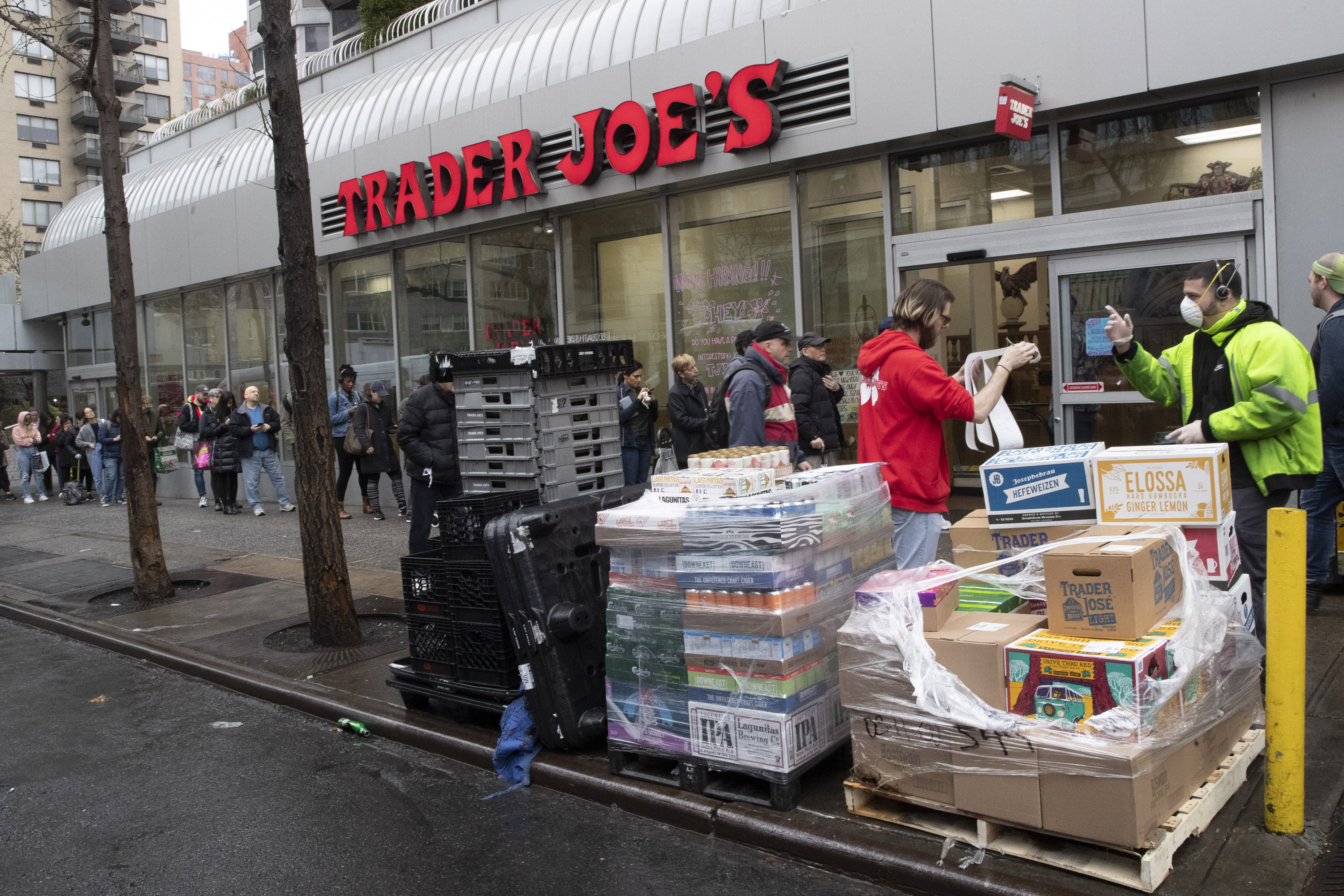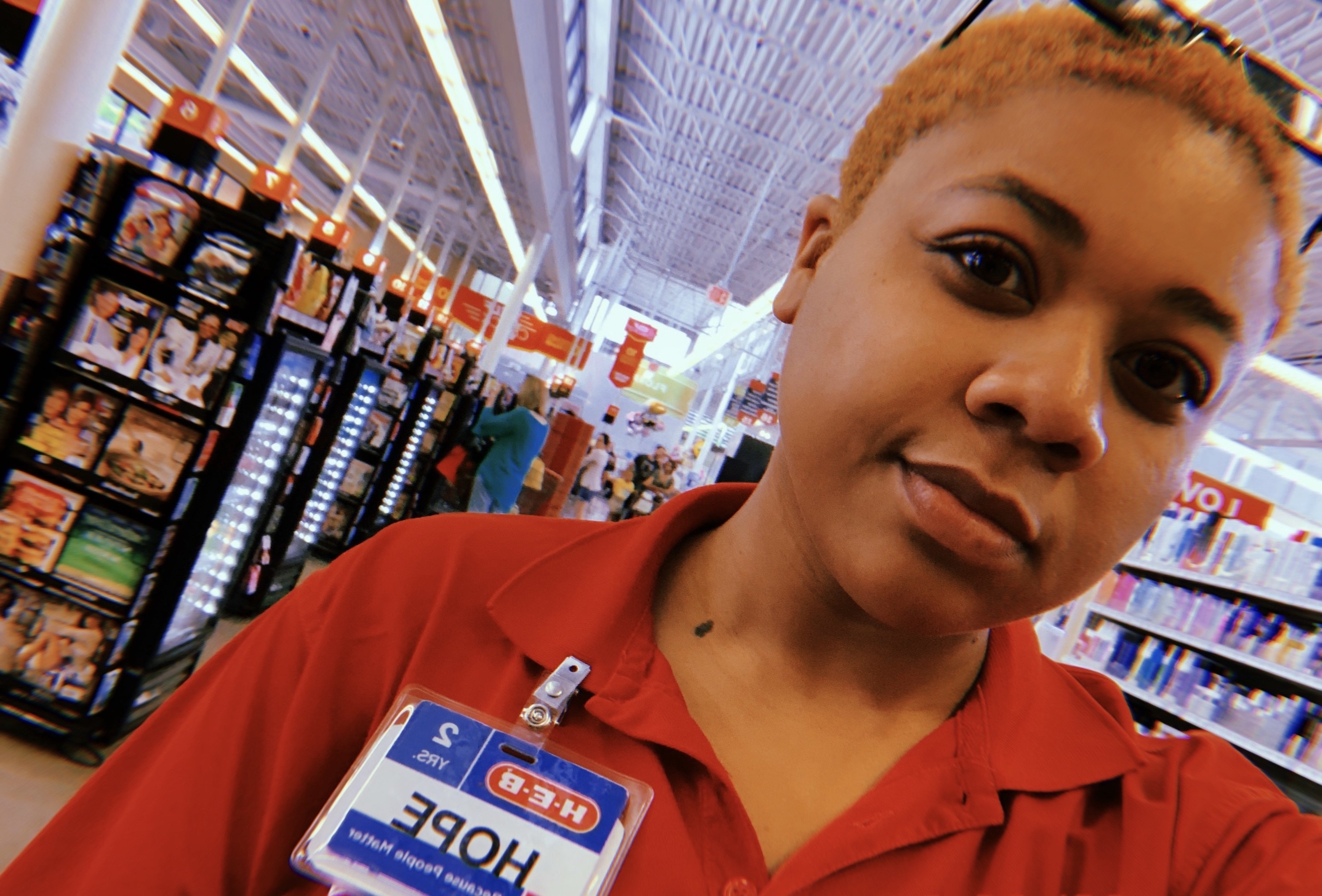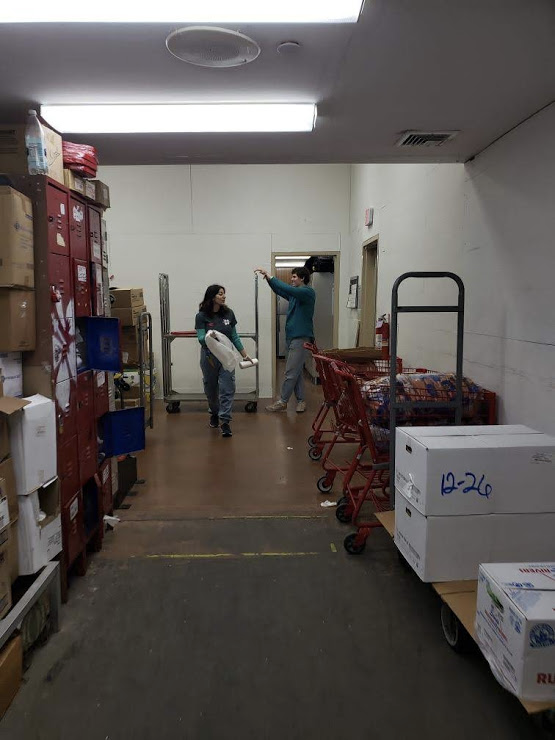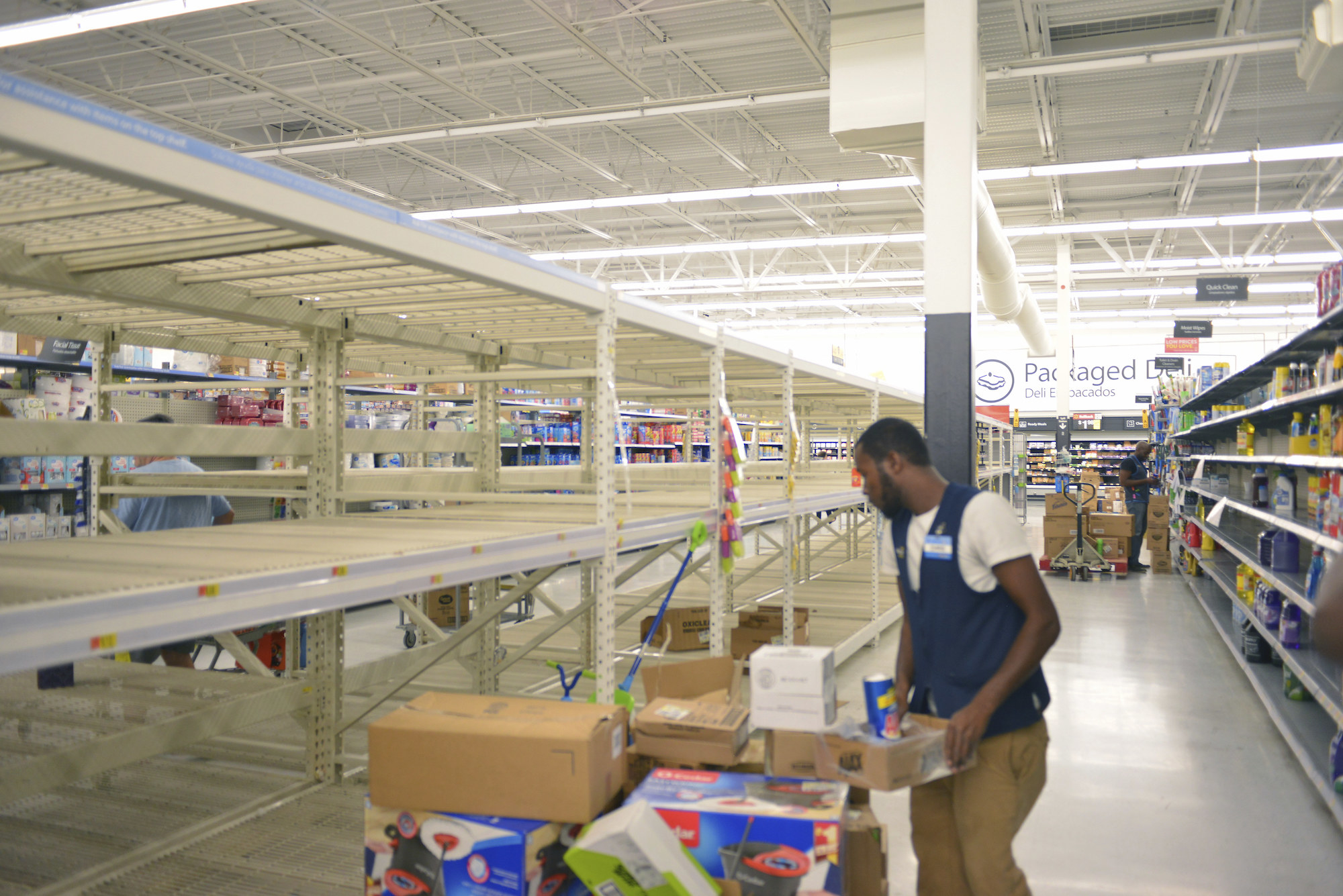The journalists at BuzzFeed News are proud to bring you trustworthy and relevant reporting about the coronavirus. To help keep this news free, become a member and sign up for our newsletter, Outbreak Today.
With countless businesses closing their doors to stop the spread of the coronavirus, work life has dramatically changed — or ended — for many people around the world.
The lucky ones have jobs they are able to do from home, which they’re hoping to cling to amid widespread downsizing and a possible recession or depression. Others have already been laid off or sent home from the stores or restaurants they work at, unsure how they’ll pay their next rent check.
But during this crisis, there are still a number of workers who are heading into work each day — even in areas where residents have been ordered to shelter in place. People who work at grocery stores, pharmacies, and other businesses deemed essential, while fortunate enough to still be earning income, are also risking their own health by working and exposing themselves to customers during the pandemic.
These are largely hourly employees, many of whom are paid minimum wage, aren’t always eligible for paid sick leave, and may not have health insurance. And while they’re on the front lines, ensuring people have enough food and medicine, some say they aren’t being adequately protected by their own employers.
“I can’t risk my own health or my family’s health for $17 an hour,” said Erica Mildner, a 26-year-old cashier at Trader Joe’s in Westchester County, New York. “We have been provided with no paid sick leave apart from what we have already accrued and are working in extremely difficult conditions, while the company is making record profits.”
Hope, a 24-year-old cashier at the Texas-based supermarket chain H-E-B, wants to wear gloves to protect herself, but she told BuzzFeed News her Houston store’s gloves policy has been unclear and is constantly in flux. (She asked not to have her last name printed for this story.)
“You’ll find out if you ask, and depending who you ask, you get a different answer, and the answer might change again,” she said.
One day last week baggers and cashiers were allowed to wear gloves, the next day only cashiers were allowed, and now gloves aren’t allowed for anyone in her store, she said. Several others have spoken out online about workers not being allowed to wear gloves at H-E-B stores, despite the store saying they have gloves available for their workers. (An H-E-B spokesperson referred BuzzFeed News to a section on their website that discussed the company’s sick leave policy, but makes no mention of gloves.)
“At the beginning of the day [on Sunday] we were [allowed to wear gloves] because on Saturday we were allowed to, but by the time I got there on Sunday, they said ‘no gloves,’” Hope said. “And because I didn’t want to take off the gloves, they went and took me off the register and had me restocking the shelves.”
- These Retailers Have Been Staying Open. Employees Say They’re Afraid For Themselves And Others.
- Costco Made Corporate Staff Come To The Office. An Employee Died Of COVID-19. The Office Is Still Open.
- What The Hell Are Bar And Restaurant Workers Supposed To Do For The Next Few Months?
- Amazon Said That During The Pandemic, Sales Are Soaring. Workers Say They Feel Unsafe.
- The Coronavirus Is Forcing Techies To Work From Home. Some May Never Go Back To The Office.
Gloves have been an especially heated topic for Trader Joe’s employees, who have been forbidden from wearing them unless they have a doctor’s note. Workers with the employee rights initiative the Coalition for a Trader Joe’s Union have said the company doesn’t want staff wearing gloves because they don’t look good for customers — despite the fact that customers might prefer them in gloves right now.
“We’ve had customers yell at us while on our own shifts…for not wearing gloves on register,” a spokesperson for the coalition told BuzzFeed News. “When we try explaining that it’s because we’re not allowed, they only get more upset.”
Trader Joe’s did not respond to a request for comment.
According to the coalition spokesperson, the company believes handwashing is more sanitary than wearing gloves. But while on the job, gloves are just more practical for keeping clean. “In reality, gloves are easier to maintain on register,” thee spokesperson said. “You can remove them or sanitize them between customers, they remind us not to touch our faces, and they protect any open hand wounds (eczema, paper cuts, box cuts) from exposure.”
Erica Mildner and a Trader Joe’s colleague.
Mildner, the Westchester County Trader Joe’s staffer, said she asked her manager if she could wear gloves on the job. She even offered to bring in her own latex pair from home, but was told by her manager it was against company policy. Mildner said she explained that she lives with her parents, who are in their sixties, and feared exposing them to the virus.
“I offered to work another section of the store where employees typically wear gloves and I was told that this would not be allowed,” she wrote in an online whistleblower complaint filed to the Occupational Safety and Health Administration. “Instead, I was told by three managers that working the register without gloves was an essential job function and that I could not stay at work wearing gloves.”
“They asked me to clock out and go home,” Mildner added to BuzzFeed News.
Mildner is now on unpaid leave and doesn’t expect to return to work until the pandemic subsides. She said she spoke with an OSHA official, who told her that her case wasn’t valid and that Trader Joe’s was breaking no laws. She said the official told her that there was nothing the agency could do to force her bosses to allow her to wear gloves. “It’s all left to the goodwill of employers,” Mildner said.
“They said they’ll be sending me a letter in the mail to follow up that this is categorized as an improper work refusal,” she added.
The coalition spokesperson told BuzzFeed News some individual stores have adjusted the gloves policy, but Trades Joe’s corporate office needed to suspend the rule nationally.
“Corporate hasn’t adjusted the policy so it’s getting people who are just trying to protect themselves in trouble,” the spokesperson said.
As health care workers to whom sick people turn for medicine, people who work in pharmacies are also especially at risk of being exposed to the coronavirus.
But an employee at a CVS pharmacy in Morris County, New Jersey, who asked to remain anonymous for fear of losing her job, told BuzzFeed News “almost no precautions are being taken” at her store. Staff are told to wipe down the counters every hour, and while they are permitted to wear gloves or masks, they aren’t being provided. And with the store sold out of hand sanitizer, they aren’t being given any of that either.
“I feel a responsibility to be here to help the public,” the CVS employee said. “People still need their medicine filled despite this crisis, but I wish my company would do more to protect their pharmacists and technicians.”
Even while she remains healthy, the CVS employee worries about how just doing her job could inadvertently be getting other people sick — a thought that weighs heavily on her, as someone whose job is providing medical care. “I am most worried about catching the virus and having mild to no symptoms, as most people do in my age demographic, but being at work to pass it on to many of our elderly or immunocompromised patients,” she said.
“I am sure I’ve been exposed at this point,” she added. “There have been confirmed cases in my area and numbers are climbing. All I want to do is be home safe with my family.”
CVS spokesperson Joe Goode told BuzzFeed News that all full-time employees “are eligible for paid sick time or short term disability benefits, depending on the length of illness, in the event they are sick.”
“For any store colleague who is required to self-quarantine due to potential COVID-19 exposure, they will be placed on paid leave for 14 days,” Goode said.
Still, that policy — like many other businesses’ policies — doesn’t cover people who are just afraid to do their jobs right now.
“I truly wish I could stay home during this,” said a Walmart employee in Ohio who asked to remain anonymous. “I suffer from prior respiratory issues and a terrible immune system, so I’m very worried about catching the virus.”
Walmart is among many businesses that have been adjusting their leave policies during the coronavirus outbreak. The company waived their attendance policy through April for anyone who is unable or uncomfortable coming into work, but employees must still apply for regular paid time off. Employees will only be granted paid leave without using their vacation days through a mandated quarantine or if they test positive for the virus.
“We are encouraged to go home when sick, but a lot of my coworkers can’t afford to miss work,” said the Walmart employee. “The only way we get paid leave is if the government puts our specific area under quarantine, or we miraculously find a way to get tested and test positive.”
The Walmart employee said they’ve been experiencing a high level of anxiety on the job, which has increased by being constantly surrounded by panicked people stockpiling food and supplies.
An empty shelf at Walmart in Broward County, Florida, due to panic-buying of essential goods during the coronavirus outbreak.
Similar to Walmart, Target spokesperson Danielle Schumann told BuzzFeed News her company is now providing 14 days of pay for anyone who contracts COVID-19 or is placed under mandatory quarantine.
Target is staying open due to its role in providing people with groceries and medicine. But even with the new policy, nonessential employees are still in their stores. Starbucks locations inside Target stores are still staffed and open for business.
One employee of a Starbucks inside a Target in Florida who asked to remain anonymous said he’s seen no indications his Starbucks will close, and with the location already understaffed, he feels pressure to keep going to work during the pandemic.
“There’s a grocery and pharmacy department, which I think classifies us as ‘essential,’” the employee said. “So even if the Starbucks area does shut down, we’ll likely be relegated to working as cashiers or in the food prep area since we’re Target workers.”
Most of the eight workers who spoke to BuzzFeed News for this story said they are now feeling an internal tug-of-war between continuing to make money and protecting their loved ones from the coronavirus.
The Target Starbucks employee said he’s worried about his parents, who are older and live three hours away. “If they get sick, since I’ll still be working, I’m going to have to choose between taking leave — if they’ll let me — and going to take care of them,” he said.
Hope, the H-E-B employee, lives in her parents’ home in Houston with her almost 70-year-old father and 100-year-old grandpa. She’s terrified that going to work is putting her loved ones at risk.
But she’s also terrified of what would happen if she quit.
“I didn’t really budget for a pandemic,” she said.
CORRECTION
Erica Mildner’s name was misspelled in an earlier version of this post.
coronavirus in the workplace
- Amazon Scrambles To Improve Warehouse Safety Following Employee OutcryCaroline O'Donovan · 2 hours ago
- These Retailers Have Been Staying Open. Employees Say They’re Afraid For Themselves And Others.Albert Samaha · 7 hours ago
- What The Hell Are Bar And Restaurant Workers Supposed To Do For The Next Few Months?Amber Jamieson · March 17, 2020
Julia Reinstein is a reporter for BuzzFeed News and is based in New York.
Contact Julia Reinstein at [email protected].
Got a confidential tip? Submit it here.
Albert Samaha is an investigative reporter for BuzzFeed News and is based in New York.
Contact Albert Samaha at [email protected].
Source: Read Full Article








